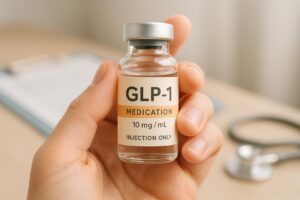Can You Get GLP-1 Without Diabetes? Insights into Usage and Access

In recent years, the conversation surrounding weight management and diabetes treatment has shifted dramatically, particularly with the emergence of glucagon-like peptide-1 (GLP-1) receptor agonists. These medications, initially designed for managing type 2 diabetes, have gained popularity for their remarkable effects on weight loss. However, many people wonder if they can access GLP-1 medications without a diabetes diagnosis. This article aims to explore this question thoroughly, providing insights into GLP-1 medications, their usage, and the implications of their growing popularity.
Introduction
Did you know that nearly 40% of adults in the United States are classified as obese? This staggering statistic underscores a serious public health challenge that demands effective solutions. As we navigate the complexities of obesity and its associated health risks, the role of GLP-1 receptor agonists has become increasingly prominent. These medications not only help manage diabetes but also show significant promise in aiding weight loss for individuals without diabetes.
As we delve into this topic, we will explore the science behind GLP-1 medications, their approval for weight loss, and the crucial question: can you get GLP-1 without diabetes? We will clarify how these medications work, discuss the eligibility criteria for their use, and examine the implications of their increasing demand. Furthermore, we will highlight TrimRx’s commitment to providing personalized weight loss solutions designed to support every individual’s journey toward healthier living.
By the end of this article, you’ll have a comprehensive understanding of the potential for accessing GLP-1 medications without a diabetes diagnosis, and how these treatments can fit into a broader weight management strategy.
Understanding GLP-1 Agonists
What Are GLP-1 Agonists?
GLP-1 agonists are a class of medications that mimic the action of the naturally occurring hormone GLP-1, which is released in the gastrointestinal tract after eating. This hormone plays a crucial role in regulating blood sugar levels by stimulating insulin secretion from the pancreas, inhibiting glucagon release, and slowing gastric emptying. As a result, GLP-1 agonists help lower blood sugar levels and can promote feelings of fullness, leading to reduced food intake.
Mechanism of Action
The efficacy of GLP-1 medications lies in their multifaceted approach to weight loss and blood sugar control:
- Insulin Secretion: GLP-1 agonists stimulate the pancreas to release insulin when blood sugar levels are elevated, helping to reduce hyperglycemia.
- Glucagon Suppression: These medications inhibit glucagon, a hormone that increases blood sugar levels, thereby contributing to better glycemic control.
- Slowed Gastric Emptying: By delaying stomach emptying, GLP-1 agonists promote satiety, which can help reduce caloric intake and support weight loss.
Approved Uses of GLP-1 Agonists
The FDA has approved several GLP-1 medications for specific indications:
- Type 2 Diabetes: Medications like Ozempic® and Trulicity are prescribed to manage blood sugar levels in individuals diagnosed with type 2 diabetes.
- Obesity: Recently, medications such as Wegovy® and Zepbound® have been approved for weight management in individuals with obesity, even if they do not have diabetes. This marks a significant shift in the use of GLP-1 agonists, expanding their application beyond diabetes management.
Can You Get GLP-1 Without Diabetes?
Growing Interest in Weight Loss Applications
As the obesity epidemic continues to rise, many individuals are seeking effective weight management solutions. The weight loss effects of GLP-1 medications have led to increasing off-label use among individuals without diabetes. Studies indicate a significant uptick in the number of people using GLP-1 agonists for weight loss, highlighting a shift in perception towards these medications as a viable option for managing obesity.
Eligibility for GLP-1 Medications
To access GLP-1 medications, individuals typically need to meet specific criteria that may include:
- BMI Requirements: The FDA has established guidelines indicating that GLP-1 medications like Wegovy® can be prescribed to individuals with a body mass index (BMI) of 30 or higher, or those with a BMI of 27 or higher who also have related health conditions such as hypertension or high cholesterol.
- Medical Assessment: A thorough medical evaluation is essential to ensure that candidates for GLP-1 treatments are suitable and to discuss potential risks and benefits.
The Role of TrimRx
At TrimRx, our journey began with a commitment to supporting individuals in achieving healthier lifestyles. By merging cutting-edge telehealth innovations with effective weight loss solutions, we provide personalized care that respects each individual’s unique journey. Our platform offers a free assessment quiz to determine eligibility for prescription weight loss medications, allowing us to tailor treatment plans that align with your health goals.
If you’re curious about whether you qualify for GLP-1 or other weight loss medications, we encourage you to take our free assessment quiz here.
The Implications of Increased Demand for GLP-1 Medications
Addressing the Shortage
As the popularity of GLP-1 medications continues to grow, so does the demand, leading to potential shortages, particularly for those who rely on these medications for managing diabetes. The increased off-label use for weight loss has raised concerns about equitable access for individuals with diabetes who need these medications to manage their condition.
Health Disparities
Access to GLP-1 medications can vary significantly based on socioeconomic factors, insurance coverage, and geographic location. This disparity raises important questions about how to ensure equitable access to these essential treatments. Healthcare providers and policymakers are urged to address these issues to promote fair access for all patients who could benefit from GLP-1 agonists.
The Future of GLP-1 Medications
Ongoing Research and Development
As research continues to unveil the potential benefits of GLP-1 medications, we can expect to see further advancements in their applications, including studies assessing their impact on other metabolic conditions. The evolving landscape of GLP-1 therapies presents exciting opportunities for innovation in obesity and diabetes management.
Tailored Treatment Approaches
At TrimRx, we are dedicated to personalizing weight loss solutions based on individual needs. Our comprehensive service includes doctor consultations, medication, lab work, and unlimited support, ensuring a holistic approach to weight management. Additionally, our partnerships with FDA-registered pharmacies for shipping weight loss medications further emphasize our commitment to safety and transparency.
Conclusion
The question of whether you can get GLP-1 medications without a diabetes diagnosis is not just a matter of eligibility; it’s part of a broader conversation about weight management, access to healthcare, and the evolving landscape of treatment options. As the understanding of obesity and related health issues grows, so too does the recognition of GLP-1 medications as vital tools in this fight.
We at TrimRx believe that sustainable weight loss is not just achievable but should be accessible to all who need it. By providing personalized, medically supervised care, we empower individuals to take charge of their health journeys. If you’re considering GLP-1 medications as part of your weight management strategy, we encourage you to take our free assessment quiz here and explore how we can help you achieve your goals.
FAQ
What are GLP-1 agonists used for?
GLP-1 agonists are primarily used to manage type 2 diabetes and support weight loss in individuals with obesity. They work by regulating blood sugar levels and promoting satiety.
Can I use GLP-1 medications if I’m not diabetic?
Yes, some GLP-1 medications, like Wegovy® and Zepbound®, are approved for weight management in individuals without diabetes who meet specific criteria.
What should I expect when using GLP-1 medications?
Individuals using GLP-1 medications may experience weight loss, improved blood sugar control, and potential side effects such as gastrointestinal symptoms. Regular monitoring by a healthcare provider is essential.
How can I access GLP-1 medications?
To access GLP-1 medications, individuals typically need to meet specific eligibility criteria. Taking our free assessment quiz at TrimRx can help determine your suitability for these medications.
Are there any risks associated with GLP-1 medications?
While GLP-1 medications are generally safe, they can have side effects, including nausea and gastrointestinal discomfort. Consultation with a healthcare provider is recommended to discuss any potential risks.
How does TrimRx support weight loss journeys?
TrimRx offers personalized, medically supervised weight loss solutions that include doctor consultations, medication, lab work, and unlimited support to help individuals achieve their health goals effectively.

Transforming Lives, One Step at a Time
Keep reading
Tracking Progress With GLP-1: What To Measure
Learn which metrics to track on GLP‑1 therapy—weight, waist, blood sugar, lipids, side effects, and non‑scale wins—and how often to monitor them.
Fatigue Solutions for Ozempic and Wegovy Users
Hydration, protein-rich meals, light activity, and better sleep can reduce medication-related fatigue and help maintain energy during weight-loss treatment.
GLP-1 Medication Side Effect Checker
Worried about GLP-1 medication side effects? Use our free checker for Semaglutide, Liraglutide, and more to learn what to expect and stay informed!



